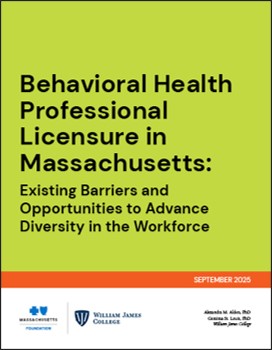

Behavioral Health Professional Licensure in Massachusetts: Existing Barriers and Opportunities to Advance Diversity in the Workforce
This report documents the licensing requirements for behavioral health providers in Massachusetts (specifically, mental health counselors, psychiatric mental health nurse practitioners, psychiatrists, psychologists, and social workers). The report also describes the barriers to licensure for clinicians from underrepresented populations, including in this report individuals who identify as Black, Indigenous, or other People of Color (BIPOC), lesbian, gay, bisexual, transgender, queer/questioning, intersex, asexual, and others (LGBTQIA+), and people who speak a language other than English as their primary language, and outlines potential solutions to these barriers. A key objective in this project was to hear directly from underrepresented populations as to specific challenges they have experienced in the path to licensure and the process of maintaining licensure, and to identify potential solutions to address these challenges. While many of the identified solutions would benefit all individuals navigating the licensure process, given the exacerbated challenges often faced by marginalized populations, reducing these barriers and fostering an equitable and inclusive licensure process holds promise for helping to grow and diversify the behavioral health workforce in Massachusetts.
